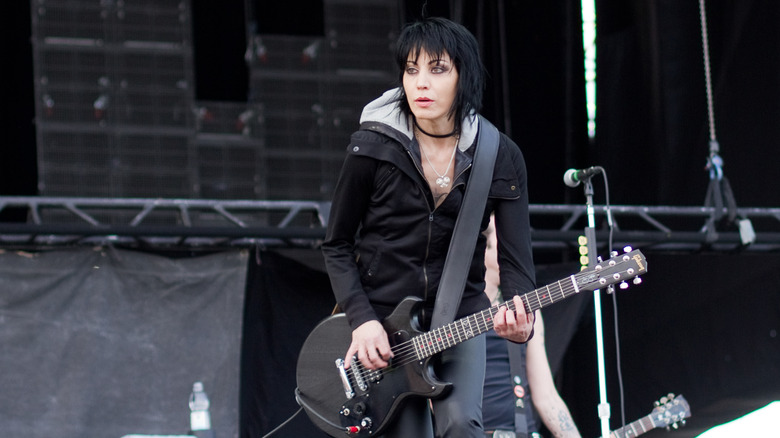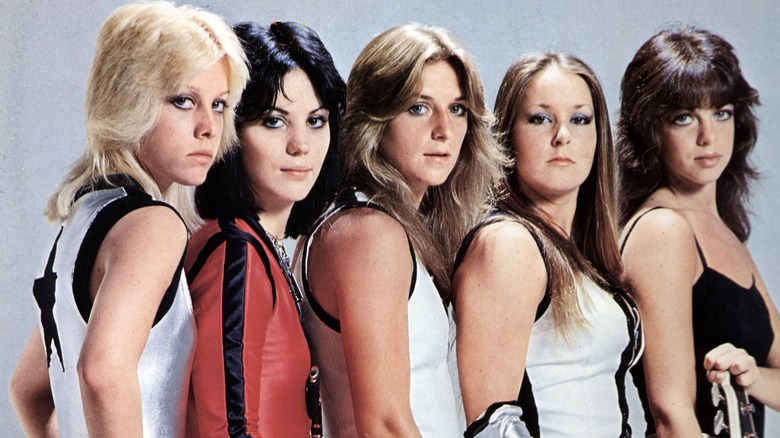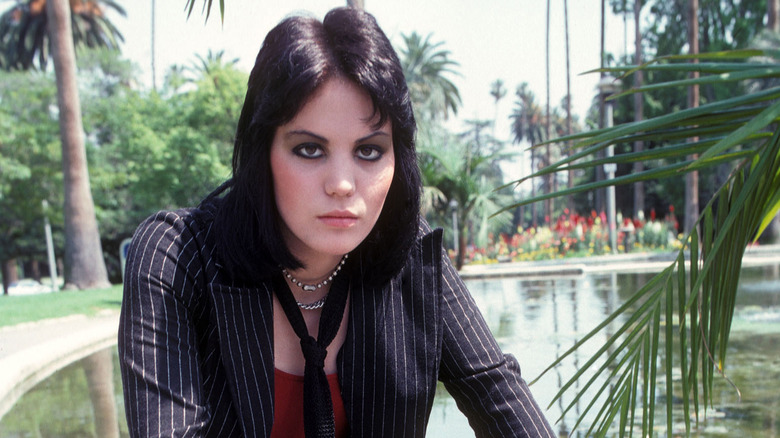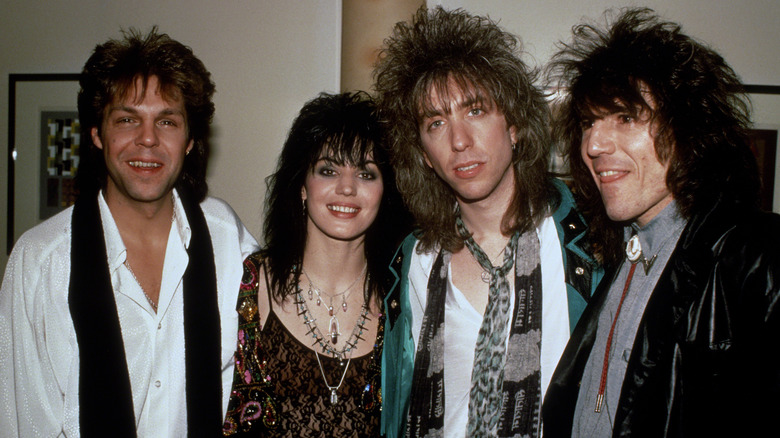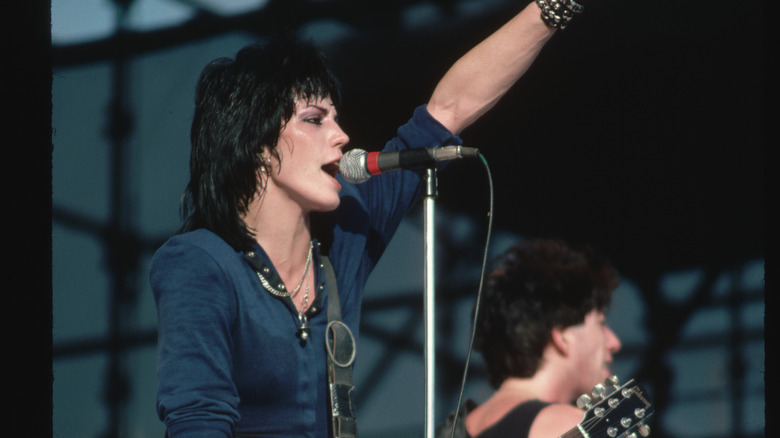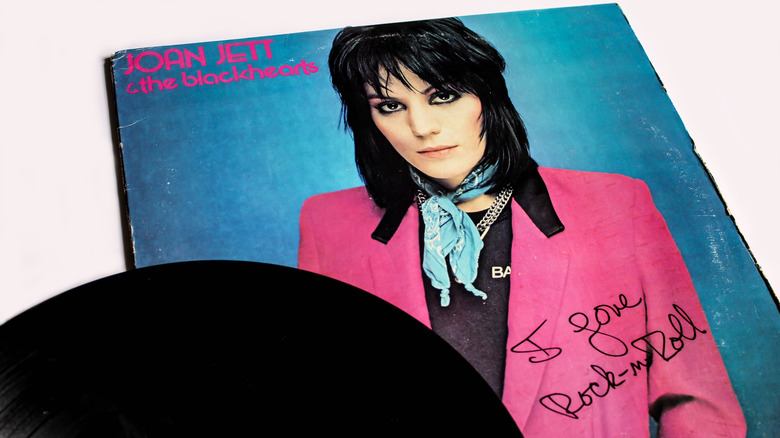How Joan Jett And The Blackhearts Started Their Band
"Joan Jett is looking for three good men," read the advertisement in the back of a Los Angeles newspaper. It was 1979, and the singer-songwriter was still reeling from the break-up of her groundbreaking all-female band the Runaways due to creative differences and infighting. Jett wanted to continue playing rock 'n' roll. And with the help of her new producer and manager, Kenny Laguna, she had begun to slowly claw her way back into the music scene after seemingly every record company in the country had slammed door after door in her face.
The industry gatekeepers may not have believed in Jett, but based on the response to her ad, her fellow musicians felt very differently. Nearly 150 people showed up for the audition. Not long after this, Joan Jett and the Blackhearts were born. Although there have been roster changes over the years, Jett and her band continue to make music more than 40 years later, including their latest, the 2023 EP "Mindsets."
The Runaways run away
Joan Jett, born Joan Marie Larkin in Pennsylvania in 1958, moved with her family to Southern California when she was 12. In 1975, at age 16, she helped found the LA-based band the Runaways, which combined elements of punk, hard rock, and glam. Over the next four years, the Runways, who were all teenage girls, toured the world incessantly and released five albums before disbanding in 1979.
Following the break-up, Jett was depressed and began drinking heavily. "After The Runaways broke up and I wasn't in good shape, I was partying too much and pretty lost," she told Louder. At one point, she even considered joining the military to get her life back on track. Instead, she left LA and headed to London, England, where she recorded three songs with guitarist Steve Jones and drummer Paul Cook of the seminal punk band the Sex Pistols. One would later change the trajectory of Jett's career: "I Love Rock 'n' Roll."
Joan Jett starts over
Joan Jett was working on a film soundtrack the Runways had been contracted to make in London when she met Kenny Laguna and they hit it off. "I worked with her on a film based on The Runaways' career, called 'We're All Crazee Now,' and had a vision of what could be," Laguna told the Tahoe Daily Tribune in 2007. "She was fantastic, but no label would take her on. I love Joanie, but never wanted to be her manager. But she became a cause."
With Laguna's help, and money fronted by rock band the Who, Jett recorded her self-titled album at the group's London studio. Since no record companies showed any interest in her music, Jett and Laguna launched Blackheart Records, making her the first female artist to start her own record label. While on the road, they sold the record out of the trunk of Laguna's Cadillac. She would later consider the lack of industry support a good thing, since it allowed her total artistic freedom. "It was a blessing in disguise not getting signed," Jett told "TimesTalks."
The Blackhearts are born
Joan Jett and Kenny Laguna relocated to Los Angeles, and Jett began looking for a band, though she was adamant she didn't want to have another all-female lineup. "After the Runaways broke up, I knew I wanted to continue playing," she told Crawdaddy magazine. "But I didn't want to form another all-girl band, 'cause I didn't want to deal with all the issues and people's head trips, discussing the fact that we were all females."
The response to Jett's ad in the newspaper caused a stir. The audition that followed was helped along by John Doe of the LA punk band X, who played bass and gave input about the 140 musicians who showed up. First up was guitarist Eric Amble, who got the job, as did bassist Gary Ryan and drummer Danny "Furious" O'Brien. It was O'Brien who came up with the band's name, which Jett loved. "We looked for a name that you could put like a graffiti on a wall," she recalled (via "Bad Reputation: The Unauthorized Biography of Joan Jett").
Joan Jett and the Blackhearts hit the road
Joan Jett and the Blackhearts hit the road playing the songs from her solo record, but it wasn't tour buses, limos, and the high life. They traveled in a rented motorhome and lived on a shoestring budget of $10 a day, playing anywhere they could while they fought it out with promoters to get the money they deserved. The band's manager, Kenny Laguna, was getting desperate. "Everybody wanted money, you can't do anything without money, and no one wanted to pay us," he told Trouser Press magazine.
Jett moved the band to New York City in 1980, where it was easier to get from gig to gig than in LA. She replaced drummer Danny O'Brien with Lee Crystal, and they again hit the ground running. But even as the group's reputation for barn-burning live shows began creating a buzz and sales of her self-released first record reached 20,000 copies, Jett still couldn't find a label. "We began touring, and it was clear that Joan was becoming a big star," Laguna recalled. "In the Northeast, they were shutting down highways when Joan Jett and the Blackhearts played. But we still couldn't get a record deal."
Joan Jett and her band hit it big
In early 1981, everything changed when a new label, Boardwalk Entertainment, signed Joan Jett and the Blackhearts. The label re-released her solo album under the new title "Bad Reputation," and it slowly climbed the charts, peaking at 51. Jett and her band's circumstances finally began to change. In June 1981, she and her fellow musicians, who had been honed to a tight rock 'n' roll unit by their endless live gigs, went into a Long Island recording studio to produce the first official Joan Jett and the Blackhearts record, "I Love Rock 'n' Roll."
By the end of the year, the album was No. 2 on the Billboard Top 200. The band's single of the same name shot to No. 1 on the Billboard Hot 100, where it stayed for seven weeks. Another single from the album, "Crimson and Clover," made it to No. 7. The album eventually sold over 10 million copies. By the summer of 1983, Jett and her band had made it to the top of the rock 'n' roll heap. They appeared at New York's Shea Stadium that August with the Police and a then-unknown band named REM before 70,000 crazed fans. Newsday, in a review of the concert, wrote that Jett and her band played their music with "vicious vigor and intensity" that "served as an eloquent reminder of why 70,000 people would stand together in a rain-splattered stadium in the first place."
